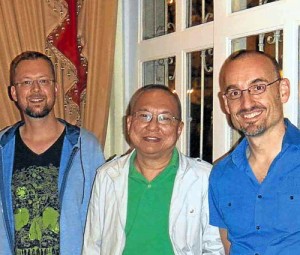Top tip: Think local, write global
IT’S only a matter of time before local entertainment gets swamped by the tide of globalization. In that sink-or-swim scenario, movie scriptwriters would do well to equip themselves with pertinent skills.
Amor Olaguer, head of the Creative Training Department of Star Cinema, recently collaborated with local firm Think Creative and international company Wigile to mount a series of workshops on scriptwriting, with visiting Australian experts and local counterparts as speakers.
Olaguer was line producer of Pepe Diokno’s Venice-winning indie film, “Engkwentro.”
The first workshop in the series was held at the National Commission for Culture and the Arts headquarters in Intramuros, Manila on May 7 and 8. It moves to Bacolod’s University of St. La Salle today and tomorrow, and then to Cebu’s University of San Carlos May 14 and 15.
Joining Filipino scriptwriters Ricky Lee (“Himala”), Rez de la Torre (“A Very Special Love”), Olaguer and ABS-CBN business unit head Raymund Dizon are Australian resource persons Luke Devenish, a TV writer, and Karel Segers, film script consultant.
<strong><em>Universal appeal</em></strong>
“Luke was head writer of ‘Neighbours,’ one of the longest-running soap operas in Australia,” Olaguer explained.
Said Filipino-Australian Rob Santos of Wigile, “Karel, a movie buyer, is knowledgeable about film writing.”
Said Lee of the Intramuros event, “The Australians were engaging speakers and storytellers. Of course there are differences in the way we make soaps here and abroad.” But, he said, the exchange “proved that storytelling is universal.”
Santos pointed out: “The TV and movie industries are becoming more and more global. The workshop aims to impart writing techniques employed in Hollywood and Western productions. It’s pretty intensive.”
It’s all about the craft, Olaguer said. “It’s not just about sensibilities. There’s a science behind scriptwriting.”
Santos added, “Western TV shows and movies are more structured and has a franchise orientation.”
The best way to penetrate the international scene, they agreed, is for a screenplay to “possess universal appeal without losing the uniqueness of the local culture.”
“Some Filipino drama shows are very emotional,” said Olaguer. “Emotions shouldn’t be too random, though, or the dramatic moments become less effective.”
“There should be logic behind the storytelling,” said Santos. “The writer must harness emotions in aid of the narrative.”
